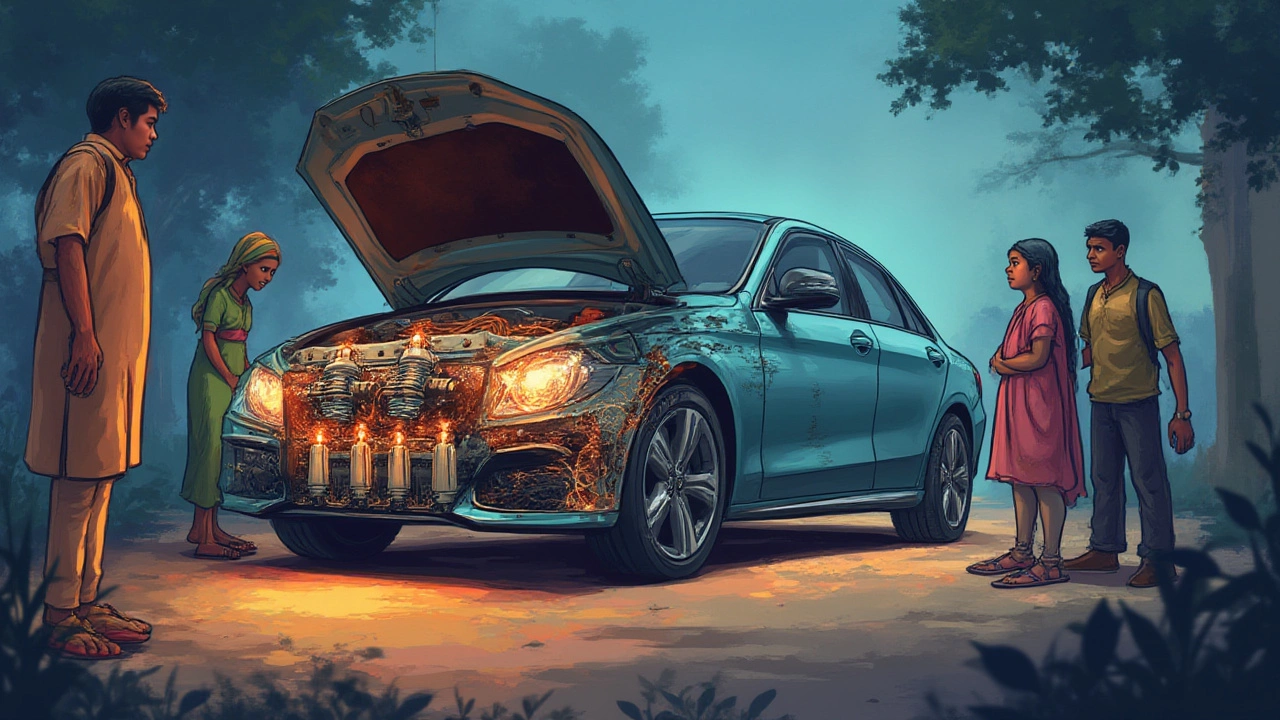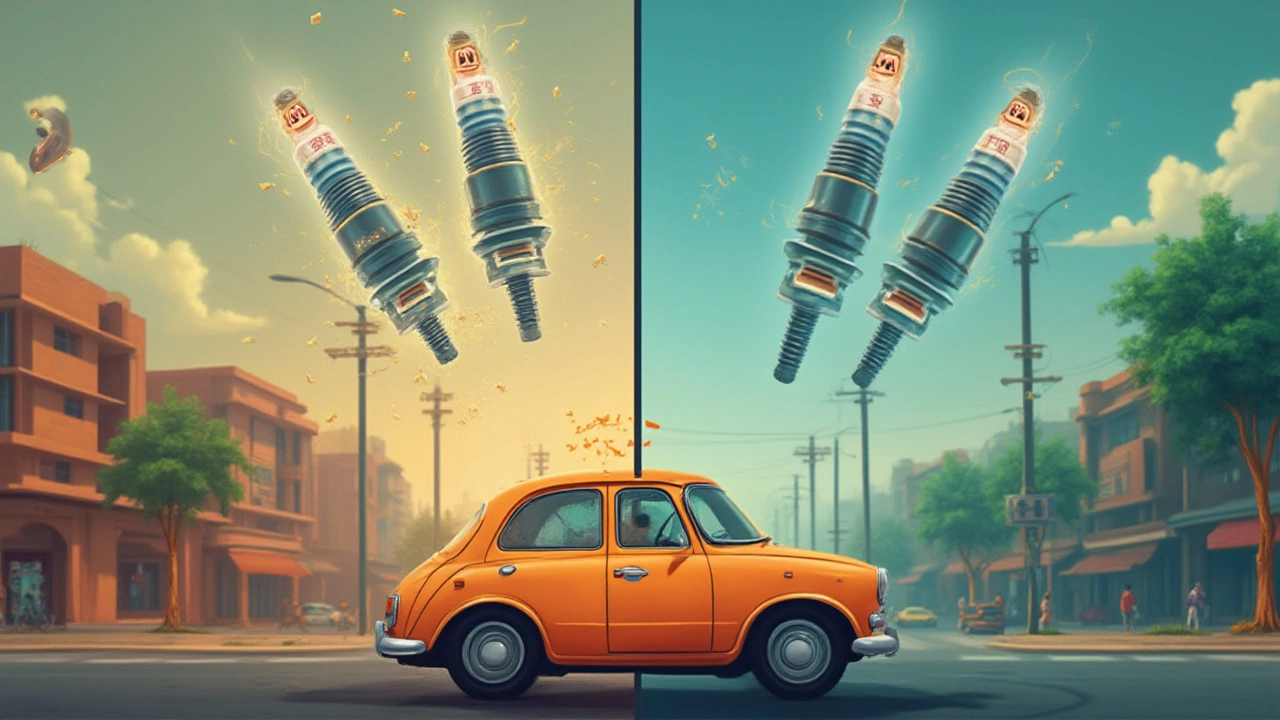 Jul, 5 2025
Jul, 5 2025
Ever had someone tell you their car sounds "off," only to find out later it just needed new spark plugs? Whether you drive a grumbling old pickup through Hamilton’s cold mornings or a zippy hatchback, it’s easy to notice when your car starts making new noises. But is all that purring, knocking, or misfiring really coming from something as humble as a spark plug? Let's bust the myths, get specific, and uncover what really happens when spark plugs get involved in the soundtrack of your ride.
How Spark Plugs Actually Work: The Hidden Culprit Behind Engine Noise
First off, the basics: spark plugs light the fire that keeps your engine running. Literally. In every gasoline engine, the spark plug sets off a tiny explosion inside each cylinder, igniting the air-fuel mixture. Without that snap of electricity at just the right microsecond, you’re not going anywhere. But what does this process have to do with how your car sounds?
Think of the combustion in each cylinder like the beat in a song. If everything is in sync, you get smooth humming. Throw in a spark plug that’s worn out, covered in grime, or simply the wrong type, and things get messy. Suddenly, those beats are off-time — pops, crackles, and stutters become part of your car's daily concert.
Back in 2022, a study from the Society of Automotive Engineers found that misfires, often linked directly to bad spark plugs, not only led to a loss in power but consistently changed engine sound, making it rougher or louder. That annoying "puttering" you sometimes hear at stoplights? Nine times out of ten, spark plugs might be the reason.
Here’s where it gets interesting. When a spark plug fails to ignite properly, unburned fuel gets pushed out with the exhaust, causing occasional pops or bangs — what gearheads call "afterfires." In city streets, that turn heads. In older cars, you might even hear a sharp "pinging" or "tapping" if the spark plugs fire out of sync. Even the rhythm of your engine can wobble, making your whole car vibrate.
Newer cars with sensitive computers will often adjust to a failing spark plug by changing the timing, which sometimes temporarily covers up noise changes. But even the smartest onboard dash computer can’t hide the rough sound of a struggling engine for long. Have you ever noticed your car growling or hesitating on cold mornings? That’s often because older or dirty spark plugs can't spark reliably when it’s chilly, which is Hamilton’s specialty from November to March.
It's not just misfires. High-resistance in old spark plugs steals voltage from the ignition, often leading to a quieter but weaker-sounding engine. That unmistakable healthy roar you get after getting a tune-up? Many times, it's simply fresh spark plugs letting every cylinder fire like it's meant to.
If your car’s sound changes after swapping spark plugs, it’s no imagination. Mechanics use engine sounds as a kind of stethoscope — even slight clicks, pings, or surges can tip them off that a plug isn’t doing its job. Sometimes, small changes in sound are your first warning sign before you see the dreaded "Check Engine" light.

When Do Spark Plugs Make a Noticeable Difference in Car Noise?
Not all changes in engine noise mean your spark plugs are to blame, but they can play a bigger role than most people think. Certain situations make plug-related sound changes a lot more common — let’s get specific about when you’ll really notice it.
First up, if you drive an older vehicle, one that’s got some years (and kilometers) behind it, you’re almost guaranteed to hear a rougher idle or a stutter when spark plugs are near retirement. This is especially true in colder climates. People in Hamilton will confirm — winter really exposes lazy plugs. When your car shudders on cold starts, that’s often a sign of weak spark, which equals ugly noises.
High-performance cars, like those running turbocharged or supercharged engines, rely more on perfect ignition timing. With the extra pressure inside those cylinders, even slightly worn plugs throw the entire firing sequence off. That’s when you get those staccato bangs, irregular pops, and sometimes even a faint whistling or chirping. It isn’t just annoying — it’s a sign something’s amiss.
If you’re a fan of aftermarket exhausts or louder mufflers, spark plug issues might be easier to notice. Performance-oriented setups amplify everything the engine does. Suddenly, a soft miss becomes a crack, and a weak cylinder starts to sound like a dropped wrench bouncing under the hood. Swapping out spark plugs can restore that crisp, strong rev you bought the system for in the first place.
Now, let’s talk about the spark plug type. Plugs come in different materials — copper, platinum, and iridium are the big three. Copper plugs fire hotter but don’t last as long. Platinum and iridium plugs last longer and handle heat better. If you switch from an old, basic copper plug to a high-grade iridium one, expect your engine to run smoother, quieter, and with more consistent power. It’s not magic — better sparks equal better combustion, and better combustion always makes for cleaner, steadier sounds under the hood.
Here’s something you may not know: Wrong spark plug gap can change everything. Each engine is designed for plugs with a specific gap — the distance between the center electrode and the ground electrode. Too wide, and the spark gets lazy; too narrow, and it misses altogether. This creates everything from knocking to sudden surging, making your car sound everywhere between a chainsaw and a sewing machine. Many mechanics in Hamilton see this every spring when drivers change their own plugs for the first time and get the gap wrong.
Let’s get practical with a quick table to sum up some sounds and their likely plug-based causes:
| Sound | Likely Spark Plug-Related Cause |
|---|---|
| Rough idle / shaking | Worn or fouled spark plugs |
| Sharp pinging / tapping | Incorrect spark plug gap or detonation |
| Sudden loud pops | Afterfire from misfiring plug |
| Engine hesitating on acceleration | Spark plug can’t fire under load |
| Sudden loss of power with noise | One or more plugs dead/misfiring |
If you notice these sounds, skip the guessing and check your spark plugs first. Sometimes, even a visual check shows black carbon deposits (from rich running) or glossy white (from overheating). Each tells a story about why your ride suddenly developed quirks.
A pro-tip: If your car has more than about 100,000 km and original spark plugs, replacing them might do more for your car’s sound and smoothness than any fancy aftermarket mod. And don’t cheap out: a $30 set of plugs can make your $30,000 car sound like itself again.

DIY Tips to Tell if Spark Plugs Are Affecting Your Engine Sound
So, you’re hearing something odd and starting to suspect the plugs? You don’t need to be a certified mechanic to sort it out. Grab a few basic tools and get to work — you might save yourself a chunk of change (and embarrassment at the shop).
First step: listen. Start your car cold and let it idle. If you hear a steady rhythm, all’s well. If there’s a skipping beat, regular stutter, or that telltale “pop” from the exhaust, suspect the spark plugs. Try gently pressing the accelerator while in Park — does the engine hesitate, sputter, or sound muffled? That’s another big clue.
Pop the hood next. Pull out the plugs (wait until the engine is cold, so you don’t burn your hands or strip the threads). Compare them side by side. Here’s quick what-to-look-for checklist:
- Black, sooty plugs: You’re running rich; fuel isn’t burning completely. Weak spark or fouled plugs are likely to blame.
- Oily plugs: Oil is seeping into the combustion chamber. Plugs fire weakly, and engines sound rougher as a result.
- Light gray or tan plugs: Perfect — this is what healthy plugs look like.
- White, blistered plugs: Your engine’s running too hot or the spark plug is the wrong heat range. Noises often get sharper, with some metallic pinging.
Check the gap on each plug using a simple wire feeler gauge — they cost less than a coffee and make all the difference. Your car’s owner’s manual (or a quick Google search for your year and model) will tell you the right gap. If the gaps are off, you’re likely missing out on performance — and adding weird knocking or uneven idling.
If you change your spark plugs and your car suddenly runs smoother and sounds more “together,” you’ve found your culprit. But here’s another tip many overlook: make sure to use plugs that match what the manufacturer recommends. Going with “high-performance” plugs that aren’t right for your engine can make things worse, not better, both in sound and power.
On a side note, don’t overlap plug replacement with other major changes, like installing a new exhaust or swapping your air filter. If you tweak too many things at once, you’ll never know what really caused a sound change.
And remember — never ignore a sudden jump in engine noise. Even if it sounds "cool" or “sporty,” a noisy engine can mean money leaking from your wallet. Hamilton’s roads — and winters — are unforgiving enough without engine misfire trouble. Keeping your spark plugs fresh won’t just keep your ride purring; it could save your Saturday afternoon from parking lot embarrassment.
If you ever doubt what you’re hearing, trust your gut. Spark plugs might be tiny, but their voice in your engine’s symphony is way louder than their size suggests.